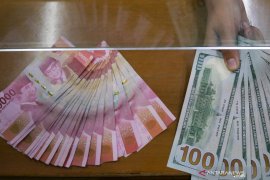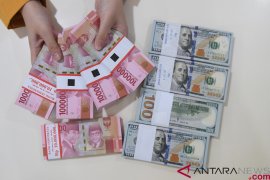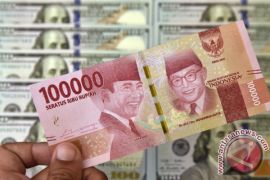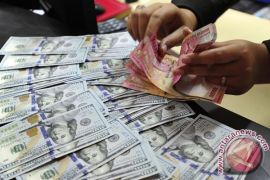"The exchange rate in 2019 is between Rp14,300 and Rp14,700 per US dollar and has a wider range as stated," BI Governor Perry Warjiyo stated at a joint meeting of the House of Representatives Budget Board in Jakarta on Tuesday.
The range was considered too optimistic by members of the Indonesian Parliament`s Budget Body. The reason is that the global economic uncertainty this year alone has made the rupiah sluggish to touch Rp14,900 per US dollar. In the current year, rupiah has weakened 7.8 percent, according to Central Bank data.
However, according to Warjiyo, there are two reasons why the rupiah exchange rate will be better next year.
BI stated that the pressure on the rupiah would subside in 2019.
First, external economic pressure next year will not be as strong as this year. The main parameter is the limitation that the US Central Bank, The Federal Reserve, will only raise its benchmark interest rate two to three times in 2019 compared to four times in 2018.
As a result, Warjiyo further stressed that the certainty of global financial markets next year will not be as big as this year.
"It is still rising, but the increase is smaller. Therefore, the global pressure and the interest rate increase will not be as high as this year," he added.
Second is the improvement in the current account deficit, which is part of the balance of payments. The current account deficit, which consists of goods and services trading, illustrates foreign exchange inflows and outflows. Simply put, if the transaction runs deficit, the foreign exchange outflow is more. If there is a surplus, the foreign exchange that goes into the country is more.
Unfortunately, the current transaction until the second quarter of 2018 is still a deficit of three percent of GDP.
Next year, the current account balance would still be in deficit, but the amount of the deficit would decrease, he explained.
One of the reasons, Perry noted, is the implementation of biodiesel fuel policy, which is a mixture of 80 percent of diesel oil and 20 percent of palm oil (B20) for all sectors starting September 1, 2018.
This year, according to Warjiyo, during the four months the B20 policy was implemented, it would reduce imports of US$2.2 billion. Next year, the projected decline in imports will reach a minimum of $6 billion.
If imports decline, the amount of foreign exchange wasted abroad will also decrease. Then, the foreign exchange ammunition to support the rupiah exchange rate will also be stronger.
With B20, there is an additional foreign exchange from export earnings of crude palm oil (CPO) due to the increase in commodity prices. In a rough calculation, BI saw the B20 policy to reduce the current account deficit with additional foreign exchange of $9-10 billion in 2019.
"The additional foreign exchange is large, not to mention the (sector) tourism," said he noted.
This year, the Central Bank will continue to double intervertion in the foreign exchange market and Government Securities (SBN) to restrain rupiah depreciation and also cheapen foreign currency swap and hedging costs, in addition to options by considering the increase in benchmark interest rates, he elaborated.
Double intervention was carried out by BI by stabilizing the forex market, so that liquidity would be maintained, and buying Government Securities (SBN) released by foreign investors in the secondary market.
Reported by Indra Arief Pribadi
Edited by Eliswan
Reporter: antara
Editor: Heru Purwanto
Copyright © ANTARA 2018












